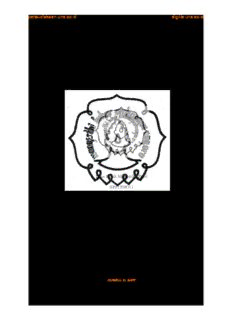Table Of Contentperpustakaan.uns.ac.id digilib.uns.ac.id
IMPROVING STUDENTS’ WRITING ACCURACY IN WRITING
EXPLANATION TEXT THROUGH DYADIC ESSAY TECHNIQUE
(A Classroom Action Research in the Tenth Grade of SMA Negeri I
Karanganom in the Academic Year of 2014/2015)
A Thesis
Dian Indah Marantika Putri
S891308011
Presented as a Partial Fulfillment of the Requirement for the Attainment of the
Magister Pendidikan Degree in English Education
ENGLISH EDUCATION STUDY PROGRAM
GRADUATE PROGRAM
FACULTY OF TEACHER TRAINING AND EDUCATION
SEBELAS MARET UNIVERSITY
SURAKARTA
2015
commit to user
i
perpustakaan.uns.ac.id digilib.uns.ac .id
commit to user
ii
perpustakaan.uns.ac.id digilib.uns.ac.id
commit to user
ii
perpustakaan.uns.ac.id digilib.uns.ac .id
commit to user
iii
perpustakaan.uns.ac.id digilib.uns.ac .id
ABSTRACT
Dian Indah Marantika Putri.S891308011. Improving Students’ Writing Accuracy
in Writing Explanation Text Through Dyadic Essay Technique. (A Classroom
Action Research in the Tenth Grade of SMA Negeri I Karanganom in the
Academic Year of 2014/1015). Thesis. Consultant 1: Dr. Abdul Asib, M.Pd;
Consultant 2: Dr. Ngadiso, M.Pd. English Education Department, Graduate
Program, Sebelas Maret University Surakarta.
This article deals with: (1) the improvement of student writing accuracy in
writing explanation text through Dyadic Essay technique, and (2) the description
of the class situation when Dyadic Essay technique is applied in the writing class.
The research was conducted in one of senior high school in Klaten district. This
study is a classroom action research. To deal with the problems, the researcher
implemented Dyadic Esssay technique as the main activity.
There were two cycles in this research. The steps were preliminary study,
planning, implementation, observation, and reflection. The subjects of the
research were the students of Class X IS3 of that school and the English teacher .
To collect data, the researcher conducted a pre-test, post-test, observations, and
interviews with the English teacher and the students. Then the data were written
down in the forms of interview transcripts and fieldnotes. To analyze the
quantitative data, the researcher used descriptive statistics by comparing the
means of the student‘s previous marks (pre-test) and the students‘ post-test marks,
while in analyzing the qualitative data, the researcher analyzed the improvement
of teaching learning process by using Constant Comparative Method.
The result of this reserach shows that the implementation of using Dyadic
Essay technique was effective to improve the students‘ writing accuracy in
writing explanation text through Dyadic Essay in the Tenth Grade of that school
in the academic year of 2014/2015. The indicators of the success of the
implementation are : (1) The students‘ writing accuracy was better. The students
had more vocabulary, their grammar was better than before, and their mechanics
in writing were better; (2) The class athmosphere was more alive, the students had
interesting activities: (a) The students were more active, the students‘ boredom
could be decreased, and (b) The teaching learning process became student
centered. This technique could be implemented by English teacher to teach
writing in that school. So the students could improve their writing accuracy.
Key words: Dyadic Essay, Explanation Text, Writing, Accuracy, Classroom
Action Research.
commit to user
iv
perpustakaan.uns.ac.id digilib.uns.ac .id
Mottos
“Start with Bismillah, end with Alhamdulillah”
“One will gain nothing without making any efforts”
(Q.S. An Najm: 39)
“Where there is a will, there is a way”
commit to user
v
perpustakaan.uns.ac.id digilib.uns.ac .id
Dedication
I dedicate this research to:
My beloved father and mother
(Drs. Suwarno & Hariyati Isnaini)
My sister
(Devi Ayu Pratiwi Putri)
commit to user
vi
perpustakaan.uns.ac.id digilib.uns.ac .id
commit to user
vii
perpustakaan.uns.ac.id digilib.uns.ac .id
TABLE OF CONTENTS
TITLE PAGE.................................................................................................. i
APPROVAL................................................................................................... ii
LEGITIMATION............................................................................................ iii
PRONOUNCEMENT....................................................................................... iv
ABSTRACT...................................................................................................... v
MOTTOS......................................................................................................... vi
DEDICATION................................................................................................. vii
ACKNOWLEDGEMENTS............................................................................. viii
TABLE OF CONTENT................................................................................... ix
LIST OF APPENDICES................................................................................. xi
LIST OF TABLE............................................................................................. xii
LIST OF FIGURE............................................................................................ xiii
CHAPTER I INTRODUCTION
A. Background to the Study.................................................... 1
B. Problem Statements............................................................ 6
C. Objectives........................................................................... 6
D. Significant of the Study...................................................... 7
CHAPTER II REVIEW OF THEORIES
A. Writing................................................................................ 8
1. Definition...................................................................... 8
2. Characteristics of Good Writing................................... 9
3. Aspect of Writing Skill................................................. 10
4. Writing Accuracy.......................................................... 11
5. Writing Accuracy Assessment...................................... 14
6. Writing Process............................................................. 21
7. The Importance of Teaching Writing............................ 23
8. Types of Classroom Performance................................. 25
9. Explanation Text........................................................... 27
10. Dyadic Essay Technique............................................... 29
11. Class Situation............................................................... 34
B. Review of Related Study.................................................... 35
C. Rationale............................................................................. 41
CHAPTER III RESEARCH METHODOLOGY
A. Setting................................................................................. 44
B. Research Schedule.............................................................. 44
C. Participants/ Subject........................................................... 45
D. Research Method................................................................ 45
E. Research Procedure............................................................ 46
F. Source of Data.................................................................... 49
G. Data Collection/ Research Instriments............................... 50
H. Data Analysis.c..o..m...m...i.t. .t.o.. .u...s.e..r. ............................................. 51
viii
perpustakaan.uns.ac.id digilib.uns.ac .id
CHAPTER IV DATA ANALYSIS & RESEARCH FINDING
A. Introduction........................................................................ 54
B. Cycle I................................................................................ 56
1. Planning......................................................................... 56
2. Implementation ............................................................. 57
3. Observation.................................................................. 70
4. Reflection....................................................................... 75
C. Cycle II.............................................................................. 80
1. Planning......................................................................... 80
2. Implementation.............................................................. 82
3. Observation................................................................... 94
4. Reflection....................................................................... 99
D. Research Findings............................................................... 102
E. Discussion of the Findings................................................. 104
CHAPTER V CONCLUSION, IMPLEMENTATION, AND
SUGGESTION
A. Conclusion.......................................................................... 109
B. Implication......................................................................... 109
C. Suggestion.......................................................................... 111
BIBLIOGRAPHY........................................................................................... 112
APPENDIXES................................................................................................. 114
commit to user
ix
Description:research were the students of Class X IS3 of that school and the English teacher . To collect data, the researcher Key words: Dyadic Essay, Explanation Text, Writing, Accuracy, Classroom. Action Research. Some English learners in the beginning level, from young children to adults need basic

